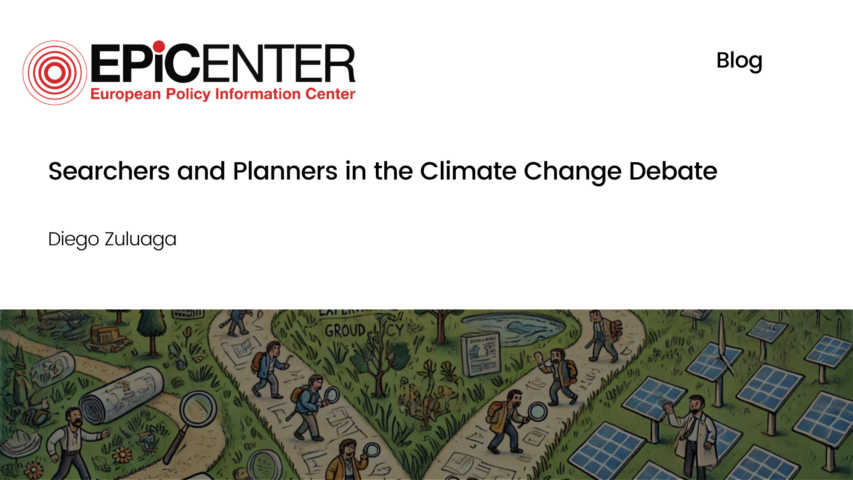Searchers and Planners in the Climate Change Debate

Searchers and Planners in the Climate Change Debate
Diego Zuluaga // 10.12 .2015
Earlier this week, I wrote about NYU Professor William Easterly’s notion of searchers vs. planners and how it is helping to transform the academic and policy debates on economic development. Today I would like to apply his distinction between bottom-up solutions that take into account local information and preferences and give the power to the people affected, on one hand, and top-down plans based on vague targets, on the other, to the issue of climate change and environmental protection. I should stress that Easterly has not himself drawn parallels to the latter issue, so what follows is strictly my interpretation of his framework.
In Paris as we speak, negotiators from around the world are busy trying to put together a set of environmental goals that will be underwritten by the majority of participants, and especially big players like China, the United States, the EU and India – the four biggest CO2 emitters in order of importance. The latest news is that the Americans have assembled a ‘high ambition coalition’ of developed countries (U.S., EU) and developing countries in Africa, Latin America and the Pacific – presumably those who expect to be disproportionately affected by climate change. They are pushing for a commitment to limit the rise in global temperatures since pre-industrial times to 1.5 degrees Celsius by 2100.
On the other side, they face a mixture of scepticism and opposition from China, India and other developing countries, who are concerned about the impact such a commitment could have on their economic growth. They accuse developed countries in the West of having caused much of the problem themselves as they industrialised and became wealthier, and now seeking to distribute the burden of responsibility among the rest.
Intuitively, it makes sense that the problem of climate change would be tackled on a multinational level through bodies like the United Nations. Its consequences are expected to be global and not limited to those countries that pollute the atmosphere. Indeed, it is hard to predict who the most affected countries will be, and to what extent they could suffer from unchecked emissions.
Additionally, there is, to some extent, a collective action problem in that emissions reductions by a single country would have a limited impact on solving the problem, while the cost of abatement would fall on it alone. Thus there is a disincentive to unilateral action by countries – although the EU, and some of its Member States in particular, have decided to take action on their own and to place the cost of climate change policy on their consumers and businesses. But in general, the perception seems to be that action against climate change is only worthwhile if a critical number of countries take part and share the burden.
The consequence is that top-down planning, in the form of the UN Framework Convention on Climate Change – the famous ‘Kyoto Protocol’ – and the current COP21 negotiations, have become the preferred vehicle to deal with the global environmental problems that are believed to be causing climate change. Theoretically this is sensible, but as we know from the experience of grandiose global summits on poverty reduction and from Easterly’s own research, it leads to unspecific targets and ineffective outcomes.
Consider the 1.5-degree limit on global temperature rises. What is the connection between this target and emissions reduction? How can investors, businesses and consumers – the ones who pay for climate change policies – plan ahead for a target that takes 2100 as its reference year? How is progress going to be measured? Should we worry if temperatures rise linearly, or at an accelerating pace? Given that temperature rises and declines appear to be influenced by human action, but not wholly, how can one apportion blame if the target is missed? Finally, how flexible should our target be if the science changes, or circumstances change?
The issues currently being discussed at COP21 are characteristic of global initiatives, on climate or poverty, or indeed on the public finances of a particular Eurozone country: full of big words, strong commitments, good intentions and important goals – but short on specifics, knowledge about the circumstances in which action will take place, and modesty as to how much a group of top elected officials with no expertise on the subject should decide on such complex issues.
These are the planners, and as we know they have a rather poor record of following through on their big commitments. Indeed, one of the major problems with planners’ targets is that they are hard to measure, which means that it is difficult to distinguish success from failure, which enables them to get away with excuses even when the targets are blatantly missed! But who would be the searchers in the climate change debate?
To my mind, they are people like Elon Musk and the engineers at Toyota, who have come up with attractive and efficient solutions to consumers’ demand for vehicles, while also reducing emissions. They are companies like Boeing and Airbus, who – reacting to market signals and changes in public preferences – have made more fuel-efficient planes a priority. They are the scientists developing new energy technologies, such as carbon capture and storage, and improving on existing ones such as solar power and fuel cells that use hydrogen. And, to the extent that they face the right market signals undistorted by public subsidies, quotas and bans, they are doing this in the least costly way to society.
The people working on the ground to assist communities as they adapt to a changing climate are also searchers. Those include agricultural experts teaching new methods and introducing more resistant crops to vulnerable farmers; non-profit organisations offering financial and technical help in home insulation and domestic renewable energy production; and businesses changing office policy – such as expected attire – in order to become more energy-efficient by, for instance, cutting down on the use of air conditioning.
There are plenty more examples that come to mind of people working on the ground and using local knowledge to solve local problems in an effective and accountable way. Yet, they all have a number of traits in common:
1) They involve the participation of local people, be they affected farmers, office workers or consumers.
2) They are based on incremental improvements rather than radical long-term objectives because they work with constantly changing information, preferences and circumstances.
3) Their targets are measurable, attainable and realistic – meaning it is clear who is responsible for what, what success looks like, and what the path (or paths) to be followed should be at every stage.
4) They place a heavy emphasis on market mechanisms – profit and loss, prices, incentives – as the most efficient way to transmit information, make use of scarce resources, balance divergent (and sometimes even contradictory) preferences, and encourage the interested parties to cooperate in a mutually beneficial way.
So, there you have it – an interpretation of environmental/ climate change policy according to the searchers vs. planners framework. Of course, Easterly came up with that framework in response, not to a problem of collective action such as is present in emissions reductions, but to a problem that affects a large number of individuals across the globe – namely, poverty. However, the point is that there is substantial scope for localised, lower-level action by searchers, quite regardless of whether action at the top happens, and how successful it is. This was an issue stressed by Nobel Prize winner Elinor Ostrom in her own Hayek Lecture, when asked about how her work on the efficient management of common pool resources applied to climate change.
There is no reason to challenge the idea that climate change requires global action at the highest levels in order to obtain binding commitments on CO2 emissions cuts. But that should not blind us to the fact that such top-down initiatives are likely to be bureaucratic, ineffective and costly because of the way in which goals are agreed and plans put into practice. It also should not lead us to believe there is nothing local communities, individuals and firms can do in order to mitigate climate change and its impact.
We may hear a lot in the coming days about the “ambitious” commitments made at COP21 and the “landmark” agreement that might be signed. However, given the experience of economic development, my money is on the searchers to be the main drivers of positive change, confronting our climate challenges while also making us all better off.
EPICENTER publications and contributions from our member think tanks are designed to promote the discussion of economic issues and the role of markets in solving economic and social problems. As with all EPICENTER publications, the views expressed here are those of the author and not EPICENTER or its member think tanks (which have no corporate view).



